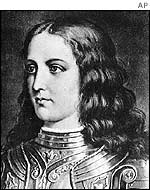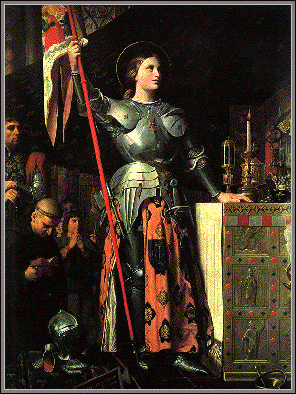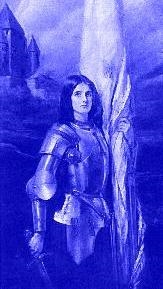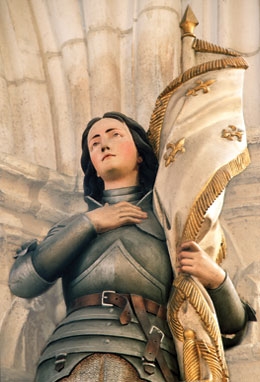To stand up for what one believes in - to save the world. These are the goals that we imagine the ideal hero striving for. This is what we see come up from our subconscious when the word "hero" is uttered...but perhaps, just perhaps, a hero is something more. Someone who would sacrifice all of herself for the good of others, for a just cause. Someone who isn't afraid to be right, even if it means being wrong to achieve their ends. Maybe then, this someone is a true hero. To me, this hero is Joan of Arc.
 |
Joan of Arc, who would later be recognized by the Catholic church as a saint, began her life in the small town of Domremy on the border of eastern France on the 6th of January, 1412. She was a happy child, most known through the village as being the most pious of anyone, and she was always scampering off to church to confess even the smallest sin. These humble beginnings would soon lead to a much larger cause. In 1424, at the age of 12, Jehanne D'Arc (her actual French name) began to see visions of what she described as Saints Catherine and Margaret, and of Michael the Archangel. These, coupled with the "Signs of God" told Jehanne to go forth and lead an army against the British in order to free France and put the current Dauphin (i.e.- "heir to the throne") , Charles VII, on the throne as King. She explained that God had taken pity on the French for all of the suffering they endured, and in 1428, she finally listened to him and went to demand an army of Charles. When she was finally granted an audience, after four repeated attempts, witnesses say that she "presented herself before his Royal majesty with great humility and simplicity, a poor shepherd girl, and ... said to the King: 'Most illustrious lord Dauphin, I have come and am sent in the name of God to bring aid to yourself and to the kingdom." (Williamson). After she convinced him by telling him accurately of a private prayer he had recently given to God, he granted her a band of men with which to carry out her quest.
 |
After repeated attempts failed to drive the English back to England on the threat of "blasphemy against Our Lord, the King of Heaven," she rallied her men to battle, readying them for the fight ahead. Carrying her beloved banner, (She carried this flag with her in every battle she fought, and would later state "I loved my banner forty times more then my sword") She cried, "All who love me, follow me!" She led them into a battle against the Saxons at Orleans where, within days, the English were beaten and Orleans was freed. When this news came back to Charles, he was ecstatic. This meant that he could now claim the throne as King Charles VII. This, being only part of what Jehanne had set out to do, was not what she considered the end of her task. She still felt that God wanted her to do something higher- that He wanted her to lead her people to utter victory, and free the commoners from the oppressions of war and hunger, sickness and overwork. Pleading with Charles to help them, she now realized that he thought she held little value any longer. He gently dismissed her, but Jeheanne wouldn't stand for it. She continued to battle the English with her loyal army, waving her banner with her signature slogan "Jhesus-Maria" in gold.
 |
In April of 1430, Jeheanne told her army that the saints had shown her the future- she would be captured before late June, saying "Pray for me, for I have been betrayed." (Williamson) Jeheanne D'Arc was taken prisoner, and the English refused to ransom her to Charles, and set a date for her trial. Through the next year, until March of 1431, the judges of her case tried all they could to convict her of anything, but because of her purity and faith, and her ability to argue successfully against any theologian, the only things they could convict her of were cross-dressing and heresy. La Pucelle," as she called herself (literally "the maiden") was sentenced to burn at the stake, for both of the above charges. Jeheanne was said to be calm while the ropes were tied about her wrists, and her sermon read to her, but when the time came for her to address the crowd and her accusers, she began to sob, saying that she forgave them for what they were doing, and asking them to pray for her. When the flames rose too high, she began to scream "...in a loud voice the holy name of Jesus, and implored and invoked without ceasing the aid of the saints of Paradise" (Williamson). English and French officials alike were overcome. Only a handful of her accusers did not now regret what they had done, and fear for their own souls for "burning a Saint." Joan of Arc was canonized by the Pope 500 years later.
 |
So maybe a hero is someone who stands up for what they believe in, and wants to save the world. Joan not only stood for it, she fought for it, and finally gave her life for the country she loved. She certainly paid the ultimate sacrifice in her quest, and even to her last breath remained true to the one who had sent her. She really was the brave Maiden that fought for her country, long grueling battles that drove her down to her core...but she kept at it. Joan of Arc is now considered a Saint but, more so than that, Joan of Arc was a true - in every sense of the word - hero.
Page created on 5/19/2009 9:52:55 AM
Last edited 9/11/2018 3:52:51 PM
